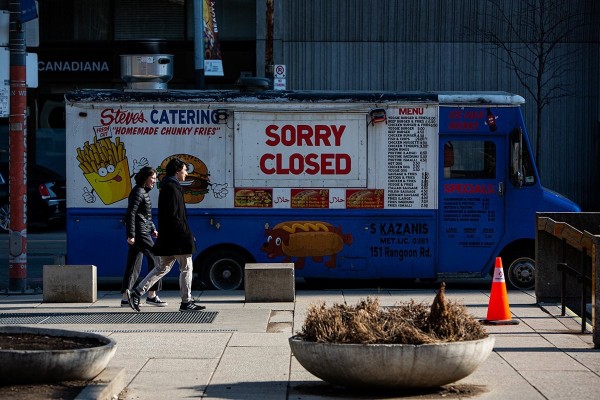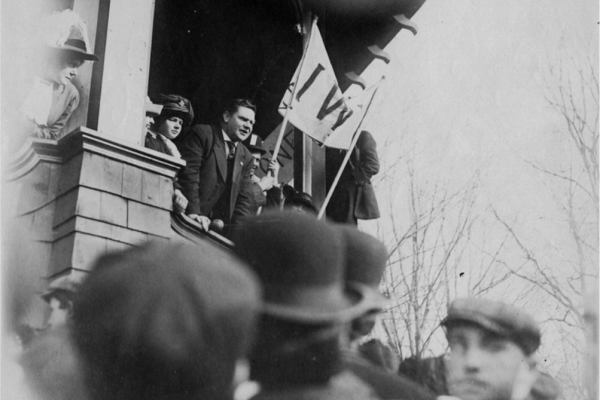Whose side is Danielle Smith really on?
Alberta needs big ideas about how to grow the province’s economy for the future, not more deference to the oil and gas industry
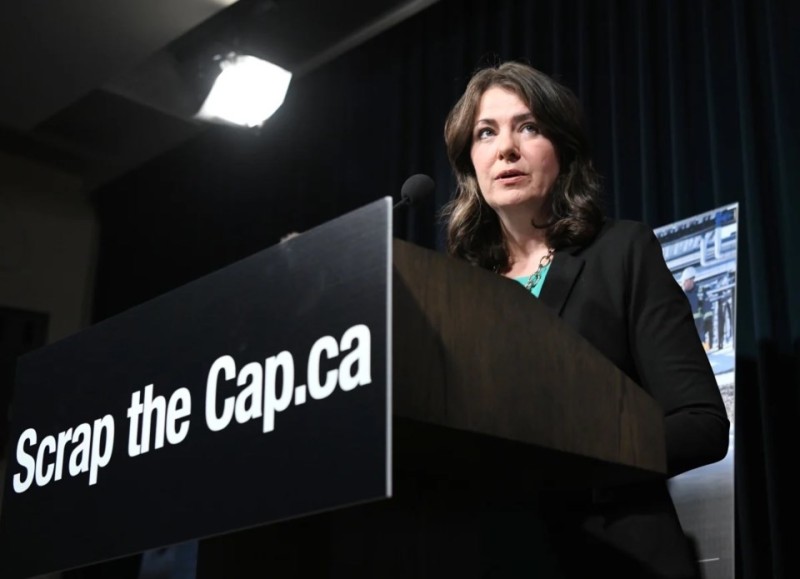
Alberta Premier Danielle Smith announcing the “Scrap the Cap” ad campaign on October 15, 2024 in Calgary. Photo by Alberta Newsroom/Flickr.
Alberta Premier Danielle Smith has made herself a central figure in Canada’s 2025 federal election. Smith’s attendance at a far-right fundraiser hosted by vocal supporters of US President Donald Trump drew attention to her appearance on a right-wing podcast where she seemed to suggest that Conservative Party leader Pierre Poilievre is “in sync” with the Trump administration. At the very least, Smith has revealed her own alignment with Trump’s agenda, and she is plainly offside with a large majority of Canadians, including on the Prairies. But Smith contends that she is speaking for Albertans and the province’s most important industry: oil and gas.
Oil and gas exports have become a divisive flashpoint in Trump’s relentless attack on Canada’s economy. While Ontario Premier Doug Ford said he would use an export tax on the province’s energy exports as a means of retaliating against Trump’s tariffs, Smith refused to do the same with Alberta’s fossil fuel exports. An export tax would put pressure on Americans by increasing the cost of energy imports. It would also generate revenue that could be used to offset the negative impact of tariffs. Importantly, it could also be used to eliminate the division Trump has tried to sow with a lower tariff rate on energy imports relative to other goods.
Economists can debate the strategy of using export taxes in response to this trade war. Among the objections is that export taxes will amplify the harm being done to Canadian industries and workers. Like tariffs, export taxes would lower demand for Canadian goods. Others point out that export taxes would largely impact ordinary Americans rather than the people promoting and benefiting from Trump’s trade war. However, we need to be clear that Smith’s refusal to consider export taxes is being done on behalf of corporate owners—not the industry’s workers or Albertans in general.
Oil and gas executives are trying to exploit the trade war
Oil and gas exports to the United States are undeniably important to Alberta’s economy. They constitute about 20 percent of Alberta’s GDP. According to data from Statistics Canada, over 40,000 jobs in the province are directly dependent on those exports, with another 100,000 indirectly dependent jobs. This doesn’t even include the jobs that rely on spending by these workers.
But ordinary Albertans have not been the primary beneficiaries of the province’s oil and gas industry, especially since 2017.
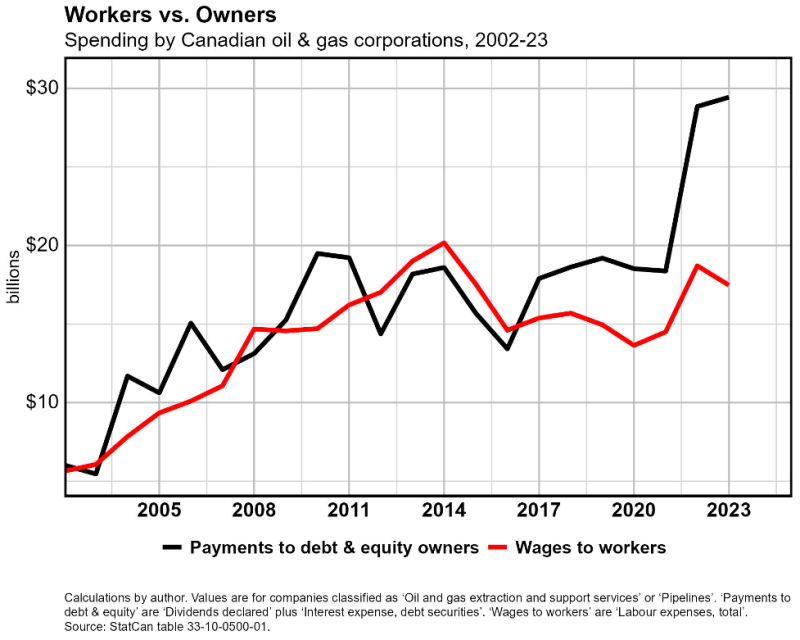
Since 2017, Canadian corporations involved in the extraction and transportation of hydrocarbons have paid out $41 billion more to the owners of their debt and equity than they paid workers. In 2023, owners received a record $29 billion while less went to workers than in 2022, which was lower than 2014.
Canadian oil and gas companies are using the trade war and popular support for more economic independence as an opportunity to advance their interests. Of course, they are framing their demands as beneficial for Canada.
Executives from 14 of Canada’s biggest oil and gas companies published an open letter to the leaders of Canada’s four largest federal parties detailing the response they want from the government to Trump’s tariff threats. Unsurprisingly, they call for more oil and gas investment. Conservative leader Pierre Poilievre incorporated their entire wish list into his party’s campaign and platform.
Analysis of the public financial data for 12 of the signatory companies finds that all 12 achieved record profits in the last four years. Profits were particularly elevated in 2022 and 2023 as oil and gas companies reaped the benefits of high oil prices, which also caused multi-decade high inflation. Despite record profits, most of the companies are not making record investments. But most of them are doing record high share buybacks.
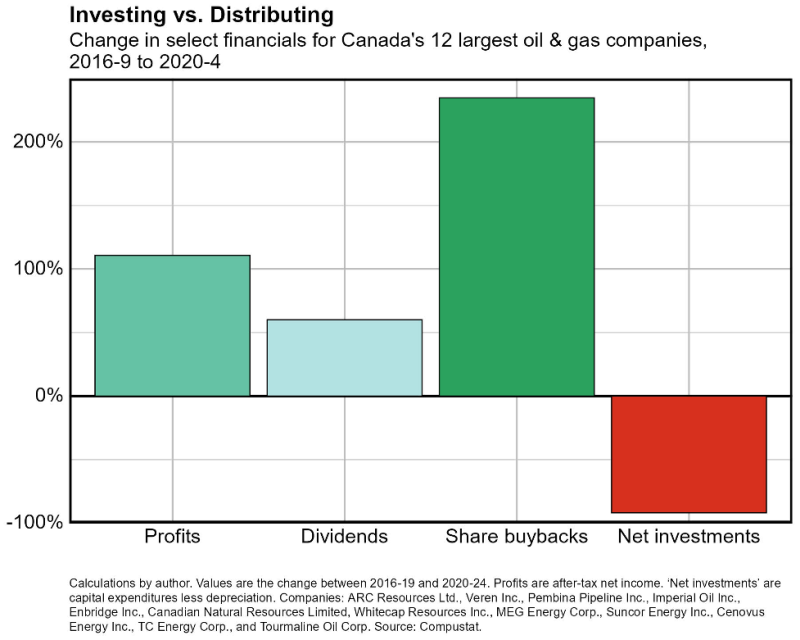
The combined profits of these 12 companies were 111 percent higher in 2020-2023 than the four years before the pandemic (2016-2019). The combined dividends were 60 percent higher, while combined share buybacks were 235 percent higher. In contrast, net investments—capital expenditure after depreciation—dropped by 92 percent.
It is particularly eye-raising for Imperial Oil to wave the Canadian flag when its majority owner is the American oil giant Exxon Mobil. Since 2020, Imperial Oil has sent $11.2 billion to Exxon in dividends and share buybacks. Over the same period, it invested a comparatively paltry $5.3 billion before depreciation, which was $9.1 billion. That means Imperial’s net investment was negative. In other words, despite record profits, Imperial is looting its productive assets to enrich its majority American owners.
How should we support oil and gas workers?
Oil and gas executives, and the politicians who parrot their talking points, are looking out for corporate owners while using workers as cover. What workers actually need is a well-funded plan to help them transition from the oil and gas sector, which is also what most Albertans want. Done correctly, this plan would support workers and allow Alberta to become less reliant on a single sector, which is in long-term decline.
Oil and gas executives are just doing their jobs, which is to make the owners of their companies as wealthy as possible. But politicians do not have to capitulate to their self-serving demands, let alone actively peddle the corporations’ talking points. Instead, government leaders should be aggressively pursuing new possibilities to develop their economies.
There is untold potential in all of the fossil fuel dependent regions of Canada. But that potential needs to be actively fostered with public programs supported with public dollars. The private sector has repeatedly shown that it will not lead where these regions need to go. In their defence, the incredible uncertainty about the global economic future makes private money reluctant to undertake risky investments. But Albertans cannot wait. They need leadership from the public sector.
In 2022, the Alberta Federation of Labour released a report titled “Skate to Where the Puck is Going.” It is filled with many creative, forward-thinking ideas about how to develop the province’s economy for the future. This plan stands in stark contrast with Danielle Smith’s approach, which assumes the only thing Albertans can do is extract and export fossil fuels. Such low expectations are disrespectful to average Albertans, but they fit with the elitist thinking of Smith’s actual constituents: the ultra-wealthy executives and owners of oil and gas corporations.
D.T. Cochrane is senior economist with the Canadian Labour Congress, Canada’s largest labour organization.








